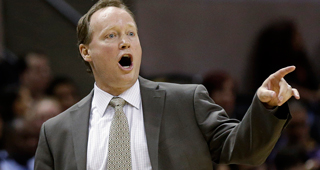Don’t look into the camera; look into the camera. The appeal of these team-by-team preview series—even this one, which varies in focus and scope and will absolutely not leave you more edified about your favorite squad’s frontcourt bench options—is that they’re democratic in a way regular coverage of the NBA isn’t. In the coming season, you’re going to read and listen to a lot of stuff about the Warriors, Celtics, and Cavaliers. The Knicks will dominate the news cycle at certain points, for doing something spectacularly dumb or surprisingly competent. The Rockets are fascinating. Chris Paul and James Harden are either going to submit some groundbreaking work on passing geometry or Harden is about to discover that he is in fact capable of hating someone more intensely than he did Dwight Howard. We’re going to be inundated with so much chatter about a handful of franchises, and the Nets and Suns and Magic and even quite good teams like the Jazz and Nuggets are going to be doing whatever it is they’re doing in relative obscurity.
So we start the season with each team getting some appointed stage time. For the writer, it’s an exercise—thirty squads, thirty prompts. That doesn’t mean thirty worthwhile pieces, but there is at least always something to write about. For the reader, who probably doesn’t ingest the whole shebang, it’s an opportunity to read about whichever teams they care to. If you truly want some words about the Atlanta Hawks—who have no fanbase, who are essentially invisible when they’re not a playoff team—here they are for you, assembled with about as much thought and effort as was given to the ones about the Cavs and Warriors. For six paragraphs, the Hawks suddenly matter, or they’re treated that way.
At its best, this could be like object-oriented ontology: a search for meaning beyond the sphere of what’s been deemed traditionally important. In arguing implicitly that the Hawks are worthy of consideration, even if we don’t believe it, maybe we discover meaning in them we otherwise wouldn’t.
For example: Dennis Schröder came into league in 2013, touted as German Rajon Rondo. This was a time when that was still an appealing concept. Rondo was deteriorating by then, rehabbing leg injuries that we later learned were basically career-ruining, but he hadn’t yet hit his nadir in Dallas and Sacramento and the league hadn’t yet transitioned away completely from rangy point guards who can’t shoot. The most meaningful difference between Schröder and Rondo is that the former lacks the latter’s passing genius, and perhaps what has sunk Schröder—or at least landed him in the undesirable bad starter/useful backup echelon—is that he simply isn’t all that good. There’s no one thing he excels at. But he’s also a victim of the NBA undergoing a broad transformation—the Pace and Space Revolution, if you want to call it that—at the same time he was just trying to get a basic grasp on it. Even if Schröder’s development had gone more smoothly and he was indeed now, at twenty-four, German Rajon Rondo, we probably still wouldn’t regard him highly, because that sort of player is barely viable anymore.
We mine for the profound and sometimes emerge with something halfway interesting. Like a lot of things, it is probably a waste of time.
Mike Budenholzer sat on Gregg Popovich’s bench for seventeen years, from age twenty-seven to age forty-four, before the Hawks brought him aboard. You knew the name, if your NBA nerdery ran deep enough, but all the knowledge anyone needed upon his hiring was that he was spiritually Spursian, believing in a kind of regimented expressiveness and possessing a knack for discovering what’s spectacular about otherwise ordinary players. Budenholzer has realized his own spin on Spursiness in Atlanta. It reached its apotheosis in Coach Bud’s second season, when Kyle Korver looked like circa 2008 Ray Allen and DeMarre Carroll was a three-and-D revelation.
And yet: joyfulness is an immeasurable thing, and there will always be people who love one thing or another, but there was something aggressively prescribed about the whole thing, a quality that has become more visible as the Hawks have declined in recent seasons. Maybe we don’t think of Pop as offputtingly boss-like because he let Boris Diaw drink wine and understands that what Manu Ginobili has is something you can’t teach or control, but Budenholzer, who scans as Pop without the worldliness, comes off as an expert gym teacher and his teams play like they’re trying to approximate a computer simulation. At their best, Budenholzer’s Hawks have been impressive if a little alienating, and at their worst—the way they are now—they’re a crushingly boring office job of a team. Budenholzer proves the point that Popovich’s greatness has never been about knowhow alone.
There are dustier corners of our cultural consciousness worth exploring. It sometimes seems like there are five TV shows, three musicians, two comedians, and no authors. Everything is in some way about the president these days. To break from the hivemind is a relief that comes at the cost of loneliness, and some corners are dusty for a reason. In them you find not nothing, but not enough either. Perhaps the discovery of anything at all is a kind of miracle, but with whom are you sharing it?
More Futures: Boston Celtics, Brooklyn Nets, Charlotte Hornets, Chicago Bulls, Cleveland Cavaliers, Dallas Mavericks, Denver Nuggets, Detroit Pistons, Golden State Warriors, Houston Rockets, Indiana Pacers, Los Angeles Clippers, Los Angeles Lakers, Memphis Grizzlies, Miami Heat, Milwaukee Bucks, Minnesota Timberwolves, New Orleans Pelicans, New York Knicks, Oklahoma City Thunder, Orlando Magic, Philadelphia 76ers, Phoenix Suns, Portland Trail Blazers, Sacramento Kings, San Antonio Spurs, Toronto Raptors, Utah Jazz, Washington Wizards



